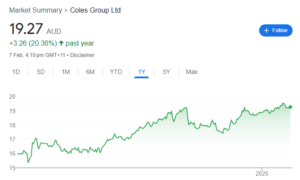Is Coles’ 10% Product Reduction a Smart Strategy for Long-Term Growth or a Temporary Cost-Cutting Measure?
![]() Ujjwal Maheshwari, February 7, 2025
Ujjwal Maheshwari, February 7, 2025
Every time you enter a supermarket, do you become overwhelmed by all the available choices? Australian supermarket giant Coles has addressed customer choice overload by cutting its product range by 10 per cent. The goal? To enhance both efficiency and simplicity for its shoppers. The issue is whether Coles has made a future-oriented business move or merely selected this approach to cut expenses. Eliminating product choices will likely affect customers who build loyalty through various options. Does Coles plan for long-lasting business expansion or is it adapting to prevailing marketplace conditions? The following examination explores the fundamental situation behind these events.
Understanding the 10% Product Reduction
Coles has decided to reduce its product range by 10% to streamline operations and enhance customer satisfaction. With many customers overwhelmed by excessive choices, this reduction aims to create a more efficient and focused shopping experience. By targeting key products, Coles expects to improve inventory management, reduce complexity, and increase customer loyalty. This strategy positions the company for long-term profitability by driving cost savings and boosting operational performance.
Financial Performance Overview
In the fiscal year 2024, Coles achieved AU$43.7 billion in revenue, up 7.6% from the previous year, and net income rose by 8.3%, reaching AU$1.13 billion. These results demonstrate Coles’ ability to thrive in a competitive environment. The product range reduction could further benefit Coles’ profitability by lowering costs and improving margins. With reduced operational complexity, the company is well-positioned to increase efficiency, leading to stronger returns for shareholders in the long run.

Long-Term Growth Prospects
The 10% product reduction is part of Coles’ broader strategy to drive sustainable growth. By optimising its product assortment and improving supply chain efficiency, Coles aims to enhance profitability, increase customer satisfaction, and build long-term loyalty. These improvements will reduce costs, improve margins, and help Coles maintain a competitive edge in the marketplace, driving future growth in both revenue and net income.
The Rationale Behind the Move
Multiple strategic factors motivate Coles to eliminate at least 10% of its products from its assortment.
- Simplifying Choices: Numerous options saturate shopping experiences to the point where customers become exhausted in making choices. The simplified product assortment at Coles creates a more enjoyable shopping experience for its customers.
- Improving Supplier Relationships: Coles can establish better alliances with suppliers. The collaboration creates mutual benefits through improved quality and enhanced product consistency.
- Enhancing Operational Efficiency: A streamlined product portfolio minimises inventory complexity. It also creates potential savings opportunities. Coles can use enhanced operational efficiency to achieve better stock control and optimised shelf space use. Through product reduction, Coles intends to enhance operational flow while improving customer satisfaction and supplier alignment so the company achieves lasting success.
Potential Benefits for Coles
There are several possible benefits for Coles in terms of a strategic move to reduce its product range by at least 10%.
- Increased Customer Satisfaction: A more curated product selection can improve the shopping experience and potentially increase customer loyalty. Coles is unifying products that really matter to customers by simplifying choices and increasing satisfaction.
- Cost Savings: A smaller product range can also reduce operational costs, such as inventory management and shelf space utilisation. Concentrating on key products and simplifying inventory management could enable Coles to become more efficient at allocating resources.
- Stronger Supplier Partnerships: Coles can also work more effectively with suppliers on key products and ensure quality and consistency. It provides a better relationship with suppliers and better collaboration across the board.
Is This a Long-Term Strategy or a Temporary Measure?
Coles’ decision to reduce its product range by 10% aligns with its long-term strategy to improve operational efficiency and meet evolving customer preferences. While some may view it as a short-term fix, this move is a key part of Coles’ plan to streamline operations, boost margins, and foster long-term growth. The reduction allows Coles to focus on the most relevant products for customers, driving greater efficiency and long-term profitability.
Government Response to Supermarket Practices
The Australian government is introducing new rules in April to address unease about supermarket power and grant suppliers more protection from such practices. Suppliers will have an anonymous complaints mechanism where they can voice concerns without fear of retaliation. As the ACCC investigation continues, others like Coles and Woolworths are under rising pressure to show fair treatment of suppliers and not be encouraged to use their market dominance to increase prices.
Coles’s Commitment to Customer Trust
It has also stressed that it is keen to have good relations with customers and suppliers. The product range reduction stems from the fact that the supermarket works with its suppliers to get the best product value. But Coles says it carries out regular customer research to eliminate any unnecessary duplication and make shopping easier. The retailer builds trust by complying with Australian consumer law and improving the quality of its product range and service to shoppers.
Looking Ahead
The 10% product reduction from Coles functions as part of a strategic plan for long-term expansion instead of existing as a brief reduction of expense. Coles plans to boost both customer satisfaction and financial success through its initiatives to simplify shopping and optimise operational performance. Investors must follow Coles’ strategy evolution to monitor its influence on financial results and competitive market position.
What are the Best ASX Stocks to invest in right now?
Check our buy/sell tips
Blog Categories
Get Our Top 5 ASX Stocks for FY25
Recent Posts
The $3m super tax is coming! If you’re invested in equities, here is how it might impact you
It seems during the next 3 years, the $3m super tax will be officially a thing. Itwas blocked by the…
Northern Star Resources (ASX:NST): The $28bn gold miner that stands above them all
Northern Star Resources (ASX:NST) is by far the largest gold company on the ASX, capped at $28bn as of May…
6 ASX stocks you forgot were listed
Here are 6 ASX stocks you forgot were listed Brisbane Broncos (ASX:BBL) No it is not a mistake. This…



